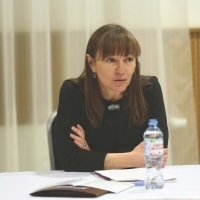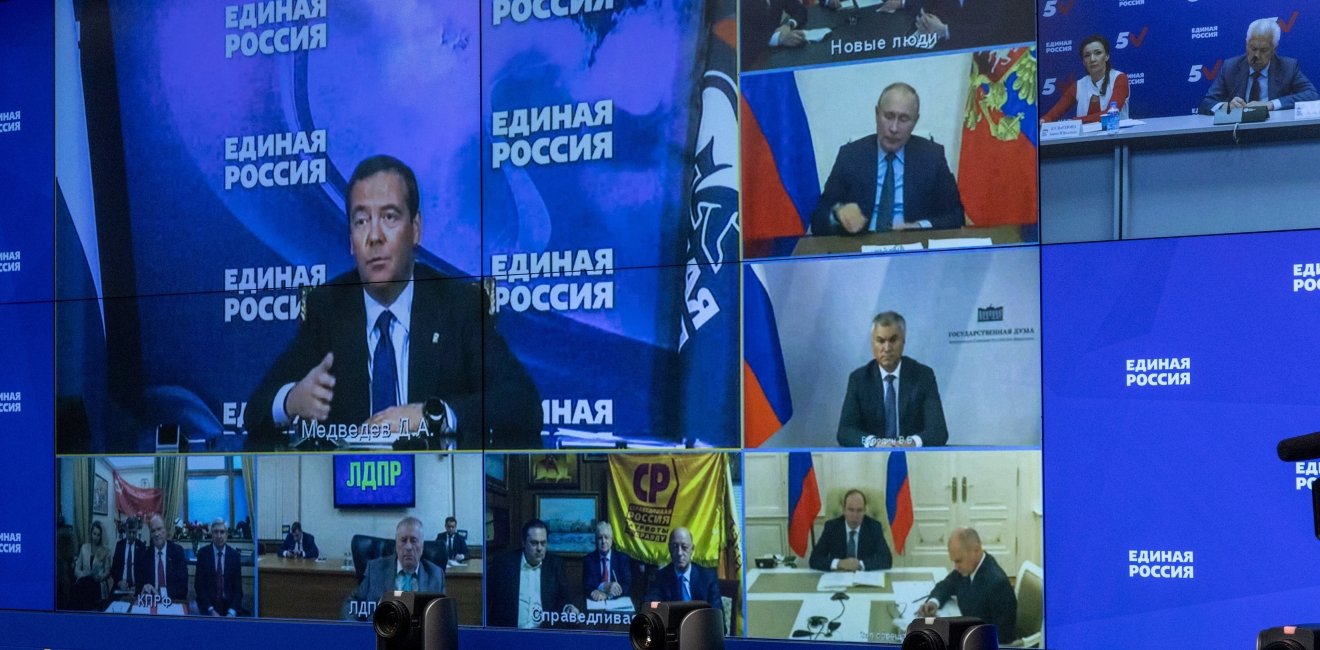
A blog of the Kennan Institute
BY LARISA DERIGLAZOVA
In Russia, news reports on the German parliamentary elections, which took place on September 26, coincided with a heated debate over the fairness of the elections to the State Duma, the lower house of the Russian parliament, which took place September 17–19. The temporal closeness of the two countries’ elections allows a side-by-side look at the Russian media commentary pertaining to both, and reveals more of the craft of Russian propagandists.
Russia’s official media and what remains of the independent outlets such as TV Rain have had very different takes on the results of the Russian elections. The two visions have no points of contiguity. Most of the debate is taking place between the ruling United Russia party and the opposition. The opposition forces are concerned with possible fraud that they say could have occurred during the three-day voting period, which saw limited possibilities for independent observers to monitor the process.
The opposition has also taken issue with the use of the remote electronic voting system, which allows voters to change their minds and vote more than once. The opposition has called for a forensic investigation of the election results and for online voting to be suspended.
According to the Russian authorities and the media in their control, the ruling party has received a constitutional majority—more than 300 seats out of the Russian State Duma’s 450 seats. Pro-Kremlin commentators have spoken of United Russia’s “heroic victory” in the face of foreign interference, domestic extremists’ threats of violence, and massive cyberattacks on the Central Voting Commission directed from abroad, in particular from the United States, according to these commentators.
That was the background to the Russian official media’s coverage of the German election. A comparison of the two narratives—the independent media’s and the official media’s—is instructive because it reveals a picture of Kremlin politics that Russia’s rulers would like to paint for the outside world.
Russian commentators have made a point of measuring German electoral politics by Russian standards. Anchors on state-run TV channels have stressed repeatedly that Germany’s election was messy and that no German party had received a clear majority. Official media have presented the results as Chancellor Angela Merkel’s personal failure.
With 24.1 percent of the vote, Merkel’s ruling CDU/CSU party, which had led a grand coalition with the Social Democratic Party of Germany (SPD) since 2013, came in second and, in terms of vote share, had its worst result ever. The SPD, at 25.7 percent, has taken the upper hand, emerging as the largest-vote-getting party for the first time since 2002. The block of the Greens and Alliance 90 won 14.8 percent, while the Free Democratic Party (FDP) took 11.5 percent of the votes.
RT gave airtime to European experts who were critical of Merkel’s legacy. One characterized Merkel as a right-wing politician who preyed on the agenda of the Social Democrats and the Greens. That, the commentator said, was the reason why “the voters have turned to the source parties.” Another commentator said that Merkel’s established image as a champion for the EU was overrated. He believed Merkel had contributed to the fragmentation and even the destruction of the EU, specifically by her decisions on migration issues in 2015.
All this is strange if one remembers that, in relations with Russia, Merkel has always been pragmatic and friendly. Her role in saving Vladimir Putin’s pet project, Nord Stream 2, is hard to overestimate. Nord Stream 2 is a controversial gas pipeline stretching under the Baltic Sea from the Russian seaport of Ust-Luga to the German coastal town of Lubmin. The pipeline’s opponents see it as Putin’s move to deprive traditional gas transit countries, including Ukraine, Slovakia, and Poland, of their transit fees.
Merkel is widely recognized as a strong leader who steered Germany to leading positions in Europe and the world. She was chancellor during the many severe crises the EU has faced over the past several years. She was there during the 2008 global economic crisis, the 2009 European debt crisis, and the 2015 refugee crisis, and is a prominent figure in negotiations over the ongoing conflict between Russia and Ukraine.
Along with Jacinda Ardern of New Zealand, Kersti Kaljulaid of Estonia, Erna Solberg of Norway, and a few others, Merkel has been a member of the club of top-ranking women in politics. Criticisms lodged against her as a politician, leader, and a woman paradoxically attack those very features that warrant praise—rationality, modesty, and a readiness to compromise without abandoning values and principles.
Among the five winning parties in Germany’s elections, the Russian media have focused on the Green Party and the Alternative for Germany (AfD), a populist movement active mostly in the east of the country. The Greens are portrayed by Russian media as a party that gets transgender deputies into parliament and thus, for Russia’s propagandists, represents the “new face of Europe.” The characterization is often accompanied by a video of Tessa Ganserer, the first openly transgender person in the German Bundestag.
A more important reason for such a steely focus on the Green Party, however, is its negative position on Nord Stream 2 and a possible continued effort to prevent the pipeline from becoming fully operational. The AfD result was presented as proof of the growing influence of the radical right-wing party, without the Russian commentators mentioning the ongoing close cooperation between Russia’s officials and the AfD. TV anchors often spoke of Ukrainian leaders who were deeply frustrated because, according the propagandists, Ukraine could no longer rely on close cooperation with and special attention from Germany in managing the Russia-Ukraine crisis.
The Russian official commentary referred to U.S. president Joe Biden as an ignorant politician who was not aware of the German elections and their results. On the English-language RT channel the references to the Unites States were much more intense than in other media. Dmitry Medvedev, a guest speaker on RT, commented that the German elections showed the importance of big tech companies starting to control political life and that about 90 million voters who supported Donald Trump had been denied the possibility of following him on Twitter, while Twitter did not stop advertising Aleksei Navalny to Russian voters. Medvedev also mentioned cyberattacks on Russia’s Central Voting Committee, with more than half of the attacks coming from the USA.
In this way the elections in Germany presented an opportunity for the Russian media to repeat criticisms of Western democracies while defending the controversial results of Russia’s own elections.
The opinions expressed in this article are those solely of the authors and do not reflect the views of the Kennan Institute.
Author

Professor, Department of World Politics; Head, Centre for European Studies; and Head, Master Degree Program on EU Studies, Tomsk State University, Russia

Kennan Institute
After more than 50 years as a vital part of the Wilson Center legacy, the Kennan Institute has become an independent think tank. You can find the current website for the Kennan Institute at kennaninstitute.org. Please look for future announcements about partnership activities between the Wilson Center and the Kennan Institute at Wilson Center Press Room. The Kennan Institute is the premier US center for advanced research on Eurasia and the oldest and largest regional program at the Woodrow Wilson International Center for Scholars. The Kennan Institute is committed to improving American understanding of Russia, Ukraine, Central Asia, the South Caucasus, and the surrounding region through research and exchange. Read more

Explore More in The Russia File
Browse The Russia File
Chechnya as a Model of Modern Russia

Russia’s Indigenous Communities and the War in Ukraine

Gas and Power in a Changing US–Russia Relationship

